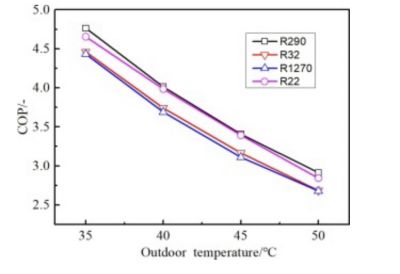Navigating the World of Refrigerants In Heat Pumps: A Guide for Homeowners
My understanding is that manufacturers overstate their refrigerant benefits, generally suggesting they have the higher efficiency. There are so many complexities that I expect they are correct in some way. It’s easy however to find references on the net suggesting R290 has a higher COP than R32 - a bit of Googling gives(link below, its all a bit complicated, no I didn’t read it…):
I think R290 is generally the best choice for a homeowner. The manufacturer will promote and make whatever they think will sell. The maintenance/installer would prefer something that cannot burn, and is a controlled substance f-gas (fluorinated hydrocarbon) maintaining their monopoly.
https://www.sciencedirect.com/science/article/pii/S1359431121005007
Like some other posters, I have my doubts about the claim that R290 is less efficient than R32. There are no references to external sources to evidence this, nor to the claims about R290 resulting in an additional 3 tons per year of CO2 being generated from the additional production of electricity claimed to be required.
However, the most important (but unmentioned) fact? That R32 is to be banned as a refrigerant from almost all new heat pump installations by the EU from 2026. And, given its GWP of 675, that isn’t at all surprising. Propane would probably have become the refrigerant of choice years ago were it not for the flammability aspect. That disadvantage has been superseded now by the need to use more climate friendly refrigerants given the urgency of the climate emergency. In addition, because specialist certification in the handling of refrigerants is not required for R290 installations, potential installers will find it easier to enter the heat pump installation market, installation prices should go down and installation numbers should go up. Adding to this, as R290 enables heat pumps to run ‘hot’, consumer anxiety about having a cold home through switching technologies will reduce. Combined with the UK government’s easing of the requirement for insulation standards to be met before grants are given, and a reduced need to install larger radiators for sufficient heat to be emitted, the ingredients may be present for a significant surge in installations. Energy bills will of course be higher than necessary for those who do not install insulation measures or in some cases larger radiators which may create a new reputational risk for heat pump technology based on running costs rather than it not producing enough heat. The Government is probably thinking that home owners will later retrofit insulation and larger radiators as necessary.
Manufacturers of R32 heat pumps will be scrambling to introduce new R290 models while desperately trying to offload their R32 stock. It seems to me that the lower the number of R32 models in use the better. It’s not for nothing that R32 is being banned, given the millions of new heat pumps that will be installed and their potential for leakage and atmospheric harm. Finally it seems to me that articles in praise of R32 will please many manufacturers offloading superseded technology, especially when the article has not been updated to mention the ban.
Currently viewing this topic 1 guest.
- 27 Forums
- 2,495 Topics
- 57.8 K Posts
- 577 Online
- 6,220 Members
Join Us!
Worth Watching
Latest Posts
-

RE: Humidity, or lack thereof... is my heat pump making rooms drier?
That’s my pleasure, @andrewj. The only challenge now is...
By Majordennisbloodnok , 1 hour ago
-
RE: Electricity price predictions
@toodles @skd Then there is not going to be much from t...
By ChandyKris , 2 hours ago
-
RE: Solis inverters S6-EH1P: pros and cons and battery options
@batpred I reckon Andy might know a thing or 2 about...
By Bash , 2 hours ago
-
RE: What determines the SOC of a battery?
@batpred Ironically you didn't have anything good to...
By Bash , 3 hours ago
-
RE: Testing new controls/monitoring for Midea Clone ASHP
Here’s a current graph showing a bit more info. The set...
By benson , 4 hours ago
-
RE: Setback savings - fact or fiction?
True there is a variation but importantly it's understa...
By RobS , 4 hours ago
-

Below is a better quality image. Does that contain all ...
By trebor12345 , 4 hours ago
-
Sorry to bounce your thread. To put to bed some concern...
By L8Again , 4 hours ago
-

@painter26 — they (the analogue gauges) are subtly diff...
By cathodeRay , 5 hours ago
-
Our Experience installing a heat pump into a Grade 2 Listed stone house
First want to thank everybody who has contributed to th...
By Travellingwave , 8 hours ago
-
RE: Struggling to get CoP above 3 with 6 kw Ecodan ASHP
Welcome to the forums.I assume that you're getting the ...
By Sheriff Fatman , 11 hours ago
-
RE: Say hello and introduce yourself
@editor @kev1964-irl This discussion might be best had ...
By GC61 , 13 hours ago
-

RE: Oversized 10.5kW Grant Aerona Heat Pump on Microbore Pipes and Undersized Rads
@uknick TBH if I were taking the floor up ...
By JamesPa , 1 day ago
-

RE: Getting ready for export with a BESS
I would have not got it if it was that tight
By Batpred , 1 day ago
-
RE: Need help maximising COP of 3.5kW Valiant Aerotherm heat pump
@judith thanks Judith. Confirmation appreciated. The ...
By DavidB , 1 day ago
-

RE: Recommended home battery inverters + regulatory matters - help requested
That makes sense. I thought better to comment in this t...
By Batpred , 1 day ago
-
Bosch CS5800i 7kW replacing Greenstar Junior 28i
My heat pump journey began a couple of years ago when I...
By Slartibartfast , 1 day ago
-

RE: How to control DHW with Honeywell EvoHome on Trianco ActiveAir 5 kW ASHP
The last photo is defrost for sure (or cooling, but pre...
By JamesPa , 1 day ago
-

RE: Plug and play solar. Thoughts?
Essentially, this just needed legislation. In Germany t...
By Batpred , 1 day ago
-
RE: A Smarter Smart Controller from Homely?
@toodles Intentional opening of any warranty “can of wo...
By Papahuhu , 1 day ago
-
RE: Safety update; RCBOs supplying inverters or storage batteries
Thanks @transparent Thankyou for your advic...
By Bash , 2 days ago
-
RE: Air source heat pump roll call – what heat pump brand and model do you have?
Forum Handle: Odd_LionManufacturer: SamsungModel: Samsu...
By Odd_Lion , 2 days ago
-
RE: Configuring third party dongle for Ecodan local control
Well, it was mentioned before in the early pos...
By F1p , 2 days ago




